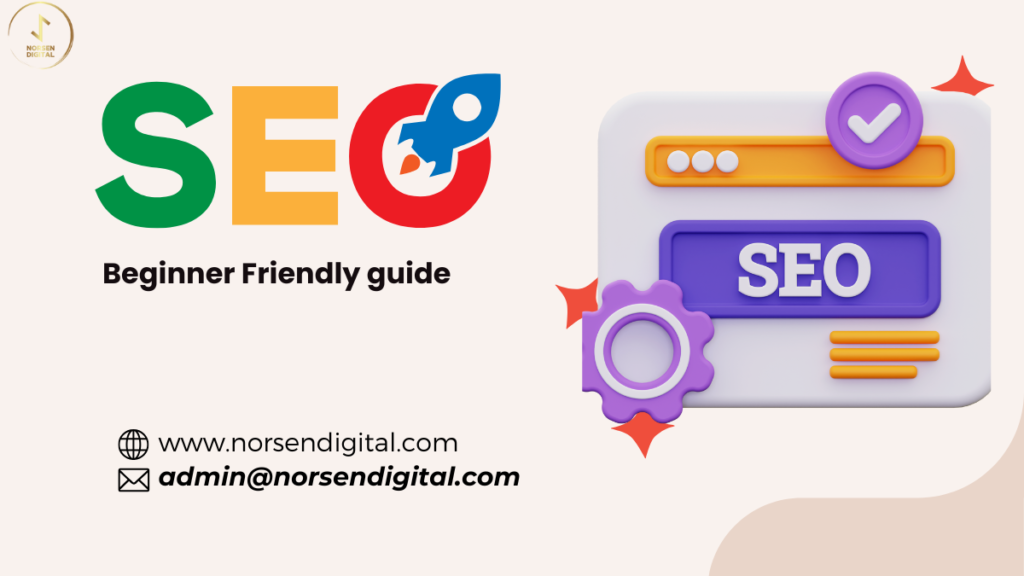If you’re running a website, you probably want it to be found by people searching for what you offer. But how do you make sure your website ranks higher on search engines like Google? That’s where SEO (Search Engine Optimization) comes in. SEO is a powerful tool that helps improve your website’s visibility and, ultimately, its ranking on search engines.
In this post, we’ll break down how SEO works, how it helps your website rank higher, and why it’s so important for your online presence.
What Is SEO and Why Does It Matter?
SEO stands for Search Engine Optimization. It’s a set of strategies and techniques aimed at improving your website’s visibility on search engines. When you optimize your site with SEO, you’re telling Google and other search engines what your website is about and why it’s valuable. The better your website is optimized, the more likely it is to rank higher on search results pages, meaning more people will see it.
Think of SEO as a roadmap that helps search engines understand your website’s content and how relevant it is to users’ queries. By following best practices for SEO, you’re improving your chances of appearing in search results, driving more organic traffic to your website.
How Does SEO Help Improve Your Website’s Ranking?
Keyword Optimization: Reaching the Right Audience
When people search for something online, they type in words or phrases—these are called keywords. SEO involves identifying the right keywords that your target audience is likely to use and incorporating them into your content. By aligning your content with popular search terms, you increase the chances of ranking higher for those searches.
However, keyword stuffing—overloading your content with keywords—is not the goal. Instead, it’s about using the right keywords in a natural, user-friendly way that makes your content helpful and relevant.
Quality Content: Engaging and Relevant
Search engines like Google aim to provide the best possible results for their users. If your website offers high-quality, informative, and relevant content, it’s more likely to rank well. That’s why SEO isn’t just about adding keywords—it’s also about crafting content that answers questions, solves problems, or provides value to the reader.
When users find content that satisfies their search intent, they tend to stay on your website longer. This sends positive signals to search engines, telling them that your site is valuable and should be ranked higher.
On-Page SEO: Optimizing Your Website’s Structure
On-page SEO refers to the elements within your website that you can optimize to improve rankings. This includes things like:
Title tags: The title of your page, which appears in search results.
Meta descriptions: A short summary of your page’s content.
Headings and subheadings: Organizing content for better readability.
URL structure: Clean, descriptive URLs that include relevant keywords.
These on-page factors help search engines understand the content of your site and how well it matches user queries.
Mobile-Friendliness: Making Your Site Accessible
With more people using mobile devices to browse the internet, it’s crucial that your website is mobile-friendly. Google prioritizes mobile-friendly websites in its rankings because it wants to deliver a great user experience to mobile users. If your site isn’t responsive, or if it takes too long to load on mobile devices, your rankings could suffer.
Backlinks: Building Authority and Trust
Backlinks are links from other websites that point to your site. When reputable websites link to your content, it signals to search engines that your website is credible and trustworthy. This can significantly boost your ranking.
However, not all backlinks are equal. Quality matters more than quantity. It’s more beneficial to have a few links from authoritative sites than many links from low-quality sources.
User Experience (UX): Keeping Visitors Happy
Search engines also consider how users interact with your site. If visitors find your site difficult to navigate or if your pages load too slowly, they may leave quickly, which can hurt your ranking. Ensuring a smooth, user-friendly experience is key to both keeping visitors happy and improving your rankings.
Why SEO Is Essential for Your Website’s Success
The main goal of SEO is to increase visibility and attract relevant traffic to your website. Higher rankings lead to more clicks, which ultimately means more opportunities for conversions—whether that’s making a sale, getting a newsletter sign-up, or encouraging other forms of engagement.
Without SEO, your website could remain buried deep in search results, unseen by potential visitors. Even if your content is amazing, it won’t reach the right people unless you’re using SEO to help it get discovered.
Final Thoughts
SEO is not a one-time task but an ongoing effort that requires patience and consistency. By focusing on the key aspects of SEO—like keyword optimization, quality content, on-page SEO, and user experience—you’ll be on your way to improving your website’s ranking and attracting more traffic.
At Norsen Digital, we specialize in SEO and WordPress development. If you’re looking to improve your website’s visibility, ranking, and performance, get in touch with us. We can help you implement effective SEO strategies tailored to your specific needs.




